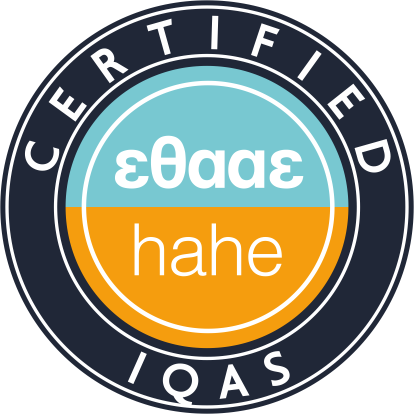The Quality Manual is an official document of the Internal Quality Assurance System (IQAS) of the National Technical University of Athens (NTUA) and serves as a guide for its implementation. It is composed of work sections referred to as processes.
Processes are sets of interdependent activities aimed at fulfilling the requirements of the relevant Hellenic Authority for Higher Education (HAHE) standard, and they produce results directly or indirectly related to the process. Each process receives relevant qualitative and quantitative input data from the Institution, known as input data, which are necessary for the operation of the process. The results of the process are called output data. Every process is subject to internal evaluation both in terms of its functionality and its effectiveness (i.e., whether it produces adequate results that justify its existence). Each process is composed of individual procedures.
A procedure is the manner in which a process is implemented. A procedure has a beginning, an end, and specific steps or stages. Procedures include steps that must be followed in order to achieve the expected result of the process. A more detailed description of the procedural steps may also be provided through relevant work instructions, which are included in the annex of the Manual.
A work instruction describes a specific stage or stages of a procedure in the form of detailed steps, with the purpose of ensuring its efficient and effective implementation.
The documentation of the processes is achieved through the use of required documents and standardized forms, either in electronic or printed format, which are included in the Annex.
The results of the processes may be evaluated using indicators defined within the framework of the IQAS Quality Manual, referred to as Key Performance Indicators (KPIs).
The main processes of the IQAS are the following:
-
The quality assurance policy of the Institution.
-
The allocation and management of resources to meet the needs of teaching, learning, research, and academic and administrative activities in general.
-
The establishment of clear and specific objectives for the continuous improvement of the quality of educational, research, and administrative work at the Institution.
-
The internal evaluation of academic and administrative activities, including in particular the internal evaluation of study programs and the Internal Quality Assurance System (IQAS), for identifying potential gaps and taking corrective actions.
-
The collection of quality data regarding educational, research, and other activities in a unified, functional, and readily accessible way: measurement, analysis, and improvement.
-
The publication of updated and objectively presented information on academic and other activities of the Institution.
-
The periodic external evaluation: accreditation/re-accreditation of study programs and the IQAS by expert committees appointed by the Hellenic Authority for Higher Education (HAHE).
